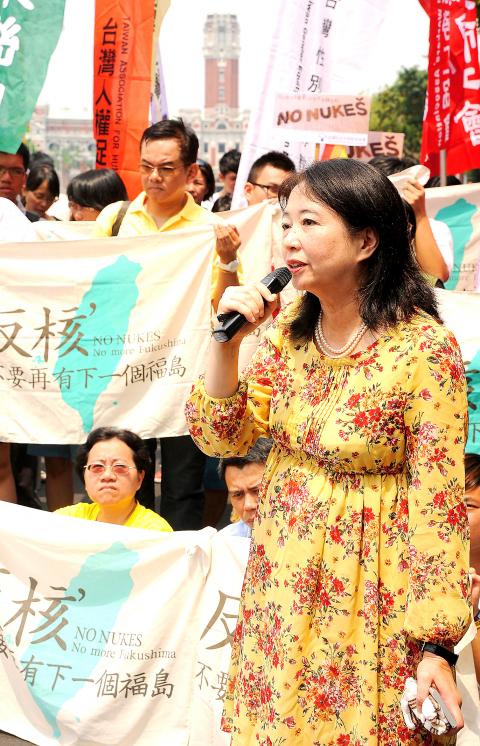The Ministry of Economic Affairs’ Bureau of Energy has admitted that it bought keyword advertising linking the names of several prominent anti-nuclear activists with a pro-nuclear Web site when any of their names is entered in search engines.
The anti-nuclear activists from various civic groups discovered that when they searched for their own names on Google, Yahoo and other search engines, a pro-nuclear power Web site (anuclear-safety.twenergy.org.tw) operated by the ministry will appear as the first suggested Web site.
As the Web site’s content is clearly in contrast with the activists’ beliefs about nuclear power, the anti-nuclear advocates, including Nuclear-Free Homeland Alliance executive director Lee Cho-han (李卓翰), Tokyo-based Taiwanese anti-nuclear writer Liu Li-erh (劉黎兒) and Green Consumers Foundation chairman Jay Fang (方儉), among others, expressed anger and disgust about the advertising link.

Photo: Taipei Times
The linkage was first discovered by Lee last week when he was searching for his own name on Google. He immediately contacted Google and Yahoo on the same day, asking them to take down the advertisement.
The Bureau of Energy said on Tuesday that it had bought the keyword advertisement on popular search engines, linking to a total of 92 keywords — including 29 names of people who often spoke publicly about nuclear power.
The bureau said that it not only linked the Web site to names of anti-nuclear activists, but also government officials, such as Premier Jiang Yi-huah (江宜樺) and Taiwan Power Co vice president Chen Pu-tsan (陳布燦), and that the purpose was to allow members of the public who are interested in nuclear power issues to notice the official Web site and get another perspective.
In response, Liu posted a statement on anti-nuclear power group Mom Loves Taiwan’s Facebook page, calling the ministry “detestable” for spending taxpayers’ money on “using lies and contrary opinions to link with my name, and making people who searched my name wanting to understand me, drink poison and be brainwashed.”
Fang also criticized the situation through his Facebook page, saying that the behavior is “extremely despicable” and suggested that legislators and the Control Yuan investigate whether the government official that spent taxpayers’ money on buying advertisements, thereby infringing upon basic human rights are qualified to manage the nation’s energy policies.
Although the search engines took down the links on Tuesday, Lee said he is considering filing a lawsuit against the bureau for its disrespect to these individuals, for which it had not even apologized.

ENDEAVOR MANTA: The ship is programmed to automatically return to its designated home port and would self-destruct if seized by another party The Endeavor Manta, Taiwan’s first military-specification uncrewed surface vehicle (USV) tailor-made to operate in the Taiwan Strait in a bid to bolster the nation’s asymmetric combat capabilities made its first appearance at Kaohsiung’s Singda Harbor yesterday. Taking inspiration from Ukraine’s navy, which is using USVs to force Russia’s Black Sea fleet to take shelter within its own ports, CSBC Taiwan (台灣國際造船) established a research and development unit on USVs last year, CSBC chairman Huang Cheng-hung (黃正弘) said. With the exception of the satellite guidance system and the outboard motors — which were purchased from foreign companies that were not affiliated with Chinese-funded

PERMIT REVOKED: The influencer at a news conference said the National Immigration Agency was infringing on human rights and persecuting Chinese spouses Chinese influencer “Yaya in Taiwan” (亞亞在台灣) yesterday evening voluntarily left Taiwan, despite saying yesterday morning that she had “no intention” of leaving after her residence permit was revoked over her comments on Taiwan being “unified” with China by military force. The Ministry of the Interior yesterday had said that it could forcibly deport the influencer at midnight, but was considering taking a more flexible approach and beginning procedures this morning. The influencer, whose given name is Liu Zhenya (劉振亞), departed on a 8:45pm flight from Taipei International Airport (Songshan airport) to Fuzhou, China. Liu held a news conference at the airport at 7pm,

Taiwan was ranked the fourth-safest country in the world with a score of 82.9, trailing only Andorra, the United Arab Emirates and Qatar in Numbeo’s Safety Index by Country report. Taiwan’s score improved by 0.1 points compared with last year’s mid-year report, which had Taiwan fourth with a score of 82.8. However, both scores were lower than in last year’s first review, when Taiwan scored 83.3, and are a long way from when Taiwan was named the second-safest country in the world in 2021, scoring 84.8. Taiwan ranked higher than Singapore in ninth with a score of 77.4 and Japan in 10th with

GRIDLOCK: The National Fire Agency’s Special Search and Rescue team is on standby to travel to the countries to help out with the rescue effort A powerful earthquake rocked Myanmar and neighboring Thailand yesterday, killing at least three people in Bangkok and burying dozens when a high-rise building under construction collapsed. Footage shared on social media from Myanmar’s second-largest city showed widespread destruction, raising fears that many were trapped under the rubble or killed. The magnitude 7.7 earthquake, with an epicenter near Mandalay in Myanmar, struck at midday and was followed by a strong magnitude 6.4 aftershock. The extent of death, injury and destruction — especially in Myanmar, which is embroiled in a civil war and where information is tightly controlled at the best of times —